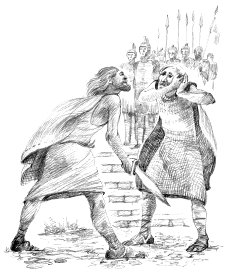THE WORD IS |
 Matt. 26:52 "For all they that take the sword shall perish with the sword." God has two spheres of authority. One is the earthly sphere or the State. It takes care of the earthly welfare of the citizens and seeks to provide them with outward peace and orderly living conditions. The other is the spiritual sphere or the Office of the Keys of the Christian Church. The Church is to proclaim the Gospel, to remit the sins of the penitent, to retain the sins of the impenitent and to do good. This is why the Church has the Word and the Sacraments. But God has not given the Church earthly authority or earthly power. On the other hand God has given the State certain earthly powers which it is to use according to need in fulfilling its responsibilities. These powers, or means of punishing, are usually called the sword. "For there is no governing authority except from God... it does not bear the sword for nothing; for it is a minister of God, an avenger who brings wrath upon the one who practices evil" (Rom. 13:1,4). When the State uses the sword, it does not break the Fifth Commandment. God, you see, is above the Commandments and He has the right to punish evildoers. When the State punishes evildoers it is only carrying out God's will. The right of the State to use the sword also applies in its relationship to its enemies, who wage war against it and who can be compared to thieves and murderers. "Fight for your brothers, your sons, your daughters, your wives and your houses" (Neh. 4:14). Jesus often associated with soldiers, but He never told them to forsake their calling. John the Baptist, speaking to soldiers, said: "Be content with your wages." A Christian may therefore with a good conscience serve the State and use the sword that has been given to the State. Although these principles are set forth clearly in the Bible, this matter has been a source of anguish for many. They remember Jesus words to Peter: "Put your sword back into its place; for all those who take up the sword shall perish by the sword" (Matt. 26:52). They conclude that Jesus denied the State the use of the sword. This difficulty disappears when we examine Jesus' words more closely. Who was denied the use of the sword? The State? No, for Jesus submitted even to the unjust treatment He received and did not tell the soldiers to put away their swords and clubs. He addressed His words to Peter who rebelled against the State. By what sword then would Peter have perished? By the sword of the State, of course. Jesus did not therefore take away the sword from the State, but rather preserved it for the State. But He did take it away from the Apostles and the Church. According to the Law of Moses the Old Testament Church had the right to use the sword against heretics. Elijah slew the prophets of Baal (see Deut. 13:5). The Church no longer has this right. This truth was taught to Peter in a very graphic way. The times when the State has to resort to much use of the sword are difficult times, not only for the nation but also for God's Church. Christians should therefore earnestly heed this exhortation of the Bible: "I urge that entreaties and prayers... be made... for kings and all who are in authority, in order that we may lead a tranquil and quiet life in all godliness and dignity. This is good and acceptable in the sight of God, our Savior, who desires all men to be saved and to come to the knowledge of the truth" (1 Tim. 2:1?4). |



